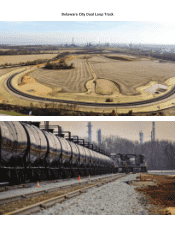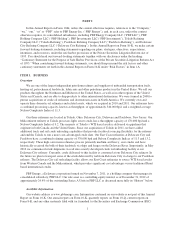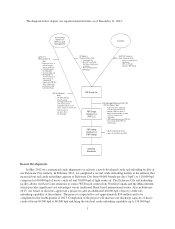PBF Energy 2012 Annual Report Download - page 14
Download and view the complete annual report
Please find page 14 of the 2012 PBF Energy annual report below. You can navigate through the pages in the report by either clicking on the pages listed below, or by using the keyword search tool below to find specific information within the annual report.
The following table approximates the Delaware City refinery’s major process unit capacities. Unit capacities
are shown in barrels per stream day.
Refinery Units
Nameplate
Capacity
Crude Distillation Unit .............................. 190,000
Vacuum Distillation Unit ............................ 102,000
Fluid Catalytic Cracking Unit (FCC) ................... 82,000
Hydrotreating Units ................................ 160,000
Hydrocracking Unit ................................ 18,000
Catalytic Reforming Unit (CCR) ...................... 43,000
Benzene / Toluene Extraction Unit .................... 15,000
Butane Isomerization Unit (ISOM) .................... 6,000
Alkylation Unit (Alky) .............................. 11,000
Polymerization Unit (Poly) ........................... 16,000
Fluid Coking Unit (Fluid Coker) ...................... 47,000
Feedstocks and Supply Arrangements. In April 2011, we entered into a crude and feedstock supply
agreement with Statoil that expires in December 31, 2015. Pursuant to the agreement as amended in October
2012, we direct Statoil to purchase waterborne crude and other feedstocks for Delaware City and Statoil
purchases these products on the spot market or through term agreements. Accordingly, Statoil enters into, on our
behalf, hedging arrangements to protect against changes in prices between the time of purchase and the time of
processing the feedstocks. In addition to procurement, for these waterborne deliveries Statoil arranges
transportation and insurance for the crude and feedstock supply and we pay Statoil a per barrel fee for their
procurement and logistics services. Statoil generally holds title to the waterborne crude and feedstocks until we
run the crude or feedstocks through our process units. We pay Statoil on a daily basis for the corresponding
volume of crude or feedstocks that are consumed in conjunction with the refining process. This crude supply and
feedstock arrangement helps us reduce the amount of investment we are required to maintain in crude inventories
and, as a result, helps us manage our working capital.
Product Offtake. We sell the bulk of Delaware City’s clean products to MSCG through our offtake
agreement, which we have given notice to terminate effective June 30, 2013. Under the offtake agreement,
MSCG purchases 100% of our finished clean products at Delaware City, which includes gasoline, heating oil and
jet fuel, as well as our intermediates. Subsequent to termination of the offtake agreement, we intend to market
and independently sell the products currently purchased by MSCG. The remainder of our products are sold to a
variety of customers on the spot market or through term agreements.
Tankage Capacity. The Delaware City refinery has total storage capacity of approximately 10.0 million
barrels. Of the total, 18 tanks with approximately 3.6 million barrels of storage capacity are dedicated to crude oil
and other feedstock storage with the remaining approximately 6.4 million barrels allocated to finished products,
intermediates and other products.
Energy and Other Utilities. Under normal operating conditions, the Delaware City refinery consumes
approximately 55,000 MMBTU per day of natural gas. The Delaware City refinery has a 280 MW power plant
located on-site that consists of two natural gas-fueled turbines with combined capacity of approximately
140 MW and four turbo-generators with combined nameplate capacity of approximately 140 MW. Collectively,
this power plant produces electricity in excess of Delaware City’s refinery load of approximately 90 MW. Excess
electricity is sold into the Pennsylvania-New Jersey-Maryland, or PJM, grid. Steam is primarily produced by a
combination of three dedicated boilers and supplemented by secondary boilers at the FCC and coker.
6
























